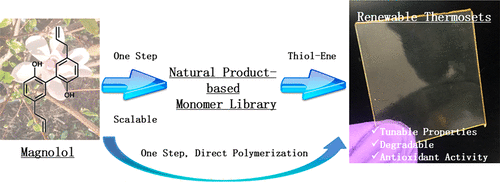当前位置:
X-MOL 学术
›
Biomacromolecules
›
论文详情
Our official English website, www.x-mol.net, welcomes your feedback! (Note: you will need to create a separate account there.)
Harnessing the Chemical Diversity of the Natural Product Magnolol for the Synthesis of Renewable, Degradable Neolignan Thermosets with Tunable Thermomechanical Characteristics and Antioxidant Activity.
Biomacromolecules ( IF 6.2 ) Pub Date : 2018-09-04 , DOI: 10.1021/acs.biomac.8b00771 Kevin T Wacker 1 , Andrew C Weems 2 , Soon-Mi Lim 1 , Sarosh Khan 1 , Simcha E Felder 1 , Andrew P Dove 2 , Karen L Wooley 1
Biomacromolecules ( IF 6.2 ) Pub Date : 2018-09-04 , DOI: 10.1021/acs.biomac.8b00771 Kevin T Wacker 1 , Andrew C Weems 2 , Soon-Mi Lim 1 , Sarosh Khan 1 , Simcha E Felder 1 , Andrew P Dove 2 , Karen L Wooley 1
Affiliation

|
Magnolol, a neolignan natural product with antioxidant properties, contains inherent, orthogonal, phenolic, and alkenyl reactive groups that were used in both direct thermoset synthesis, as well as the stepwise synthesis of a small library of monomers, followed by transformation into thermoset materials. Each monomer from the small library was prepared via a single step functionalization reaction of the phenolic groups of magnolol. Thermoset materials were realized through solvent-free, thiol-ene reactions, and the resulting cross-linked materials were each comprised of thioether and ester linkages, with one retaining the hydrophilic phenols from magnolol, another having the phenols protected as an acetonide, and two others incorporating the phenols into additional cross-linking sites via hydrolytically labile carbonates or stable ether linkages. With this diversity of chemical compositions and structures, the thermosets displayed a range of thermomechanical properties including glass transition temperatures, Tg, 29-52 °C, onset of thermal degradation, Td, from about 290-360 °C, and ultimate strength up to 50 MPa. These tunable materials were studied in their degradation and biological properties with the aim of exploiting the antioxidant properties of the natural product. Hydrolytic degradation occurred under basic conditions (pH = 11) in all thermosets, but with kinetics that were dependent upon their chemical structures and mechanical properties: 20% mass loss was observed at 5, 7, 27, and 40 weeks for the thermosets produced from magnolol directly, acetonide-protected magnolol, bis(allyl carbonate)-functionalized magnolol, and bis(allyl ether)-functionalized magnolol, respectively. Isolated degradation products and model compounds displayed antioxidant properties similar to magnolol, as determined by both UV-vis and in vitro reactive oxygen species (ROS) assays. As these magnolol-based thermosets were found to also allow for extended cell culture, these materials may serve as promising degradable biomaterials.
中文翻译:

利用天然产物厚朴酚的化学多样性来合成具有可调热机械特性和抗氧化活性的可再生,可降解的新木脂体热固性材料。
厚朴酚是一种具有抗氧化性能的新木脂素天然产物,包含固有的,正交的,酚性的和烯基的反应性基团,这些基团用于直接热固性合成以及逐步合成小的单体库,然后转化为热固性材料。小分子文库中的每种单体都是通过厚朴酚酚基的一步官能化反应制备的。热固性材料是通过无溶剂的硫醇-烯反应实现的,所得的交联材料均由硫醚和酯键组成,其中一种保留了厚朴酚的亲水性酚,另一种保留了被保护为丙酮化物的酚。其他一些通过水解不稳定的碳酸盐或稳定的醚键将苯酚引入其他交联位点。由于这种化学成分和结构的多样性,热固性塑料表现出一系列的热机械性能,包括玻璃化转变温度Tg(29-52°C),热降解起始温度Td(约290-360°C)以及极限强度,直至50兆帕。对这些可调材料的降解和生物学特性进行了研究,目的是利用天然产物的抗氧化特性。在所有热固性塑料的碱性条件下(pH = 11)都会发生水解降解,但是动力学取决于其化学结构和机械性能:在5、7、27和40周观察到,由热固性塑料生产的热固性塑料质量损失20%。分别为直接的厚朴酚,丙酮化物保护的厚朴酚,双(碳酸烯丙酯)官能化的厚朴酚和双(烯丙基醚)官能化的厚朴酚。分离的降解产物和模型化合物显示出与厚朴酚相似的抗氧化特性,这是通过紫外可见和体外活性氧(ROS)分析确定的。由于发现这些基于厚朴酚的热固性材料还可以进行扩展的细胞培养,因此这些材料可作为有前途的可降解生物材料。
更新日期:2018-09-04
中文翻译:

利用天然产物厚朴酚的化学多样性来合成具有可调热机械特性和抗氧化活性的可再生,可降解的新木脂体热固性材料。
厚朴酚是一种具有抗氧化性能的新木脂素天然产物,包含固有的,正交的,酚性的和烯基的反应性基团,这些基团用于直接热固性合成以及逐步合成小的单体库,然后转化为热固性材料。小分子文库中的每种单体都是通过厚朴酚酚基的一步官能化反应制备的。热固性材料是通过无溶剂的硫醇-烯反应实现的,所得的交联材料均由硫醚和酯键组成,其中一种保留了厚朴酚的亲水性酚,另一种保留了被保护为丙酮化物的酚。其他一些通过水解不稳定的碳酸盐或稳定的醚键将苯酚引入其他交联位点。由于这种化学成分和结构的多样性,热固性塑料表现出一系列的热机械性能,包括玻璃化转变温度Tg(29-52°C),热降解起始温度Td(约290-360°C)以及极限强度,直至50兆帕。对这些可调材料的降解和生物学特性进行了研究,目的是利用天然产物的抗氧化特性。在所有热固性塑料的碱性条件下(pH = 11)都会发生水解降解,但是动力学取决于其化学结构和机械性能:在5、7、27和40周观察到,由热固性塑料生产的热固性塑料质量损失20%。分别为直接的厚朴酚,丙酮化物保护的厚朴酚,双(碳酸烯丙酯)官能化的厚朴酚和双(烯丙基醚)官能化的厚朴酚。分离的降解产物和模型化合物显示出与厚朴酚相似的抗氧化特性,这是通过紫外可见和体外活性氧(ROS)分析确定的。由于发现这些基于厚朴酚的热固性材料还可以进行扩展的细胞培养,因此这些材料可作为有前途的可降解生物材料。


























 京公网安备 11010802027423号
京公网安备 11010802027423号